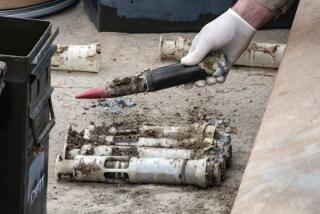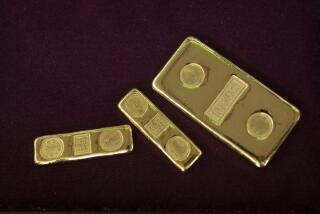Fears Rise After 4th Plutonium Bust in Germany
- Share via
BERLIN — Police in northern Germany on Tuesday confirmed the arrest of yet another plutonium black-marketeer--the fourth such seizure in the country this summer and a further advance in the chilling prospect that an international, underground trade in weapons-grade plutonium has gone from thriller writers’ imaginings to nuclear experts’ near-certainty.
The alarming news came even as authorities in southern Germany revealed that a separate bust, made at the Munich airport and first disclosed Saturday, had yielded 10.7 to 12.5 ounces of the deadly material--the largest seizure of illicit, weapons-grade plutonium on record.
Bavarian investigators said that plutonium had been carried into Germany aboard a Lufthansa flight from Moscow, as part of an offer to sell 8.8 pounds of the material for $250 million.
Experts say a crew of unsophisticated assemblers would need 13 to 18 pounds of weapons-grade plutonium to fashion a nuclear device, although some advanced devices in superpower arsenals contain just 8.8 to 11 pounds.
“The one thing that still cheers me up is that these (smugglers) are still looking around for a market and don’t seem to have any channels set up to terrorist groups yet,” said Harald Mueller of the Peace Research Institute Frankfurt, pointing out that the smugglers apprehended in Munich were so amateurish they virtually stumbled into the arms of the German police.
“You see the way they smuggle the stuff in, the way they protect themselves from nuclear materials,” he said. “It doesn’t speak of very professional or powerful organizations. But we must realize that while we know that a lot of this stuff is being found in Germany, we don’t know what share of the total illegal trade in nuclear weapons it represents.”
Germany now seems to be attracting nuclear smugglers because it is a rich nation, prompting criminals to think it could be home to wealthy buyers, and because it has the best air connections with Russia and the other former Soviet republics.
Commentators have warned since the Soviet Union’s collapse that illicit nuclear materials would eventually find their way onto the black markets here; there were, indeed, 123 known cases of illegal nuclear-materials trading in Germany in 1993 alone, Bavarian Interior Minister Guenther Beckstein said.
But in virtually all of those cases, the smugglers were relatively low-grade criminals, who saw how profitable it might be to palm off useless radioactive junk as key arms-building material. Only this summer is the real, weapons-grade plutonium starting to appear.
On Tuesday, police in the northern city of Bremen confirmed they had arrested a 34-year-old German who had offered to deliver 2.5 ounces of weapons-grade plutonium to undercover agents. They also seized 0.07 ounce of plutonium, shown to them as a sample. They said it was of Russian origin.
They conceded that, by moving in quickly to arrest their suspect, they might have let slip through their fingers the remaining plutonium he claimed to have.
“At the moment, 68 grams (2.43 ounces) of plutonium are vagabonding in northern Germany,” complained one undercover agent involved in the arrest, in an anonymous appearance on the popular television show “Kontraste.” Authorities disputed the agent’s claim.
Plutonium is dangerous not only because it is used to make nuclear weapons but also because it is, in and of itself, one of the deadliest poisons known. Inhaling as little as one ten-thousandth of a gram can cause lung cancer or leukemia; a terrorist who didn’t want to bother making a nuclear device could easily wreak havoc by using it to contaminate an urban water supply.
Ever since it became known late Monday that almost 2.5 ounces of plutonium might be on the loose in Germany, authorities here have been issuing reassurances, saying there is no proof the substance is anywhere in Germany at all and that only a tiny fraction of the small seized sample was pure, weapons-grade plutonium.
“You would need a truckload of this stuff to make a bomb,” prosecutor Hans Georg von Bock und Pollah told reporters.
That contrasts sharply with the situation in Munich, where authorities this week completed tests on plutonium they captured last Wednesday and revealed it was 87% pure--not top of the line but enough to persuade investigators that smugglers really could have put their hands on enough plutonium to make a bomb.
Police have arrested three suspects: a Colombian who had lived in Moscow and two Spaniards. A fourth suspect is still at large.
German authorities say they believe all four of the plutonium shipments captured this summer originated in the former Soviet Union--a charge heatedly denied by Moscow.
In Russia, the Atomic Energy Ministry, federal Counterintelligence Service, Foreign Ministry and President Boris N. Yeltsin’s National Security Council have all rejected the idea that the Munich seizure could have involved Russian plutonium, although Moscow has said it will cooperate with a senior German envoy scheduled to arrive later this week to discuss the crime.
Spokesmen for the Atomic Energy Ministry and the counterintelligence service insisted Tuesday that no plutonium losses had been registered at any of Russia’s atomic energy reactors and research centers.
“I am very sorry, but this is a hypothetical question,” said Foreign Ministry spokesman Grigory Karasin, when pressed to acknowledge the possibility that the plutonium could have come from Russia.
The edginess of his comment, and those of other officials, suggests that Russia views the dispute over the smuggled materials as an East-West conflict. Russian officials involved in the nuclear weapons field, highly suspicious of Western motives, have consistently downplayed concerns about the security of Russia’s nuclear materials.
For example, Vladimir Klimenko, a Yeltsin security adviser, said Western agencies and media were spreading “rumors” of nuclear leaks from Russia merely to press for “control over the production of our nuclear materials.”
Yevgeny Mikerin, deputy atomic energy minister, added: “I think this ballyhoo has a purely economic explanation: (By) telling the world that there is no proper control at nuclear enterprises, the West tries to impose on us its supervision in the construction of control systems. These are multimillion-dollar orders.”
Since the Soviet breakup, Western officials, nuclear specialists and law enforcement agencies have viewed Russia’s lack of nuclear security with alarm.
Experts on nuclear proliferation note that the former Soviet Union never established an inventory of its plutonium stock, relying instead on brute KGB force to control the material.
But now, formerly strict KGB safeguards over such substances have faltered, and to make matters worse, Russia has hundreds of thousands of underpaid soldiers and civilian atomic-energy workers--all threatened with layoffs--sitting around at its nuclear facilities.
“This is scary,” said one diplomat. “If you build a bomb, you don’t have to do it at once. You do it in little pieces. It’s probably safer that way.”
He and other experts belittled the Russian denials, pointing out that Russia is one of the few countries in the world that makes this particular form of the radioactive substance--plutonium-239--which does not occur in nature.
Russian experts said it will be possible, relatively quickly, to determine where the plutonium-239 was manufactured, as this could have been done at only a handful of sites in Russia. But they also cautioned that the material then probably was distributed to an array of places--and it will be much tougher to determine where it was stolen.
American officials said the Clinton Administration has lodged a stern protest about the incidents to the Kremlin through the U.S. Embassy in Moscow. Insiders said Washington wants to ensure that the situation receives “maximum attention” at Russia’s highest levels.
Walsh reported from Berlin and Boudreaux from Moscow. Times staff writer Art Pine in Washington also contributed to this report.
More to Read
Sign up for Essential California
The most important California stories and recommendations in your inbox every morning.
You may occasionally receive promotional content from the Los Angeles Times.













